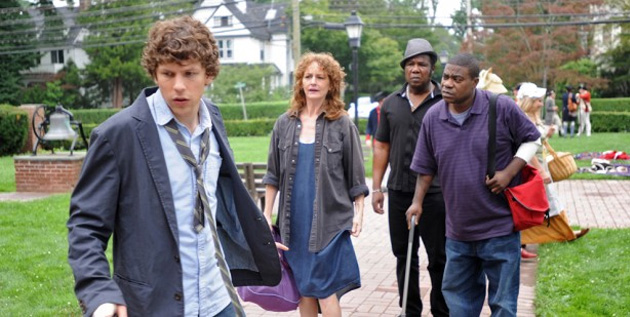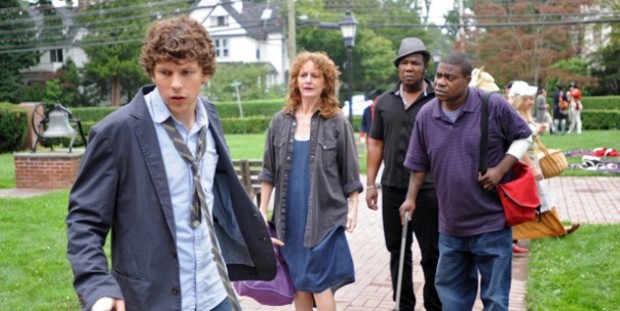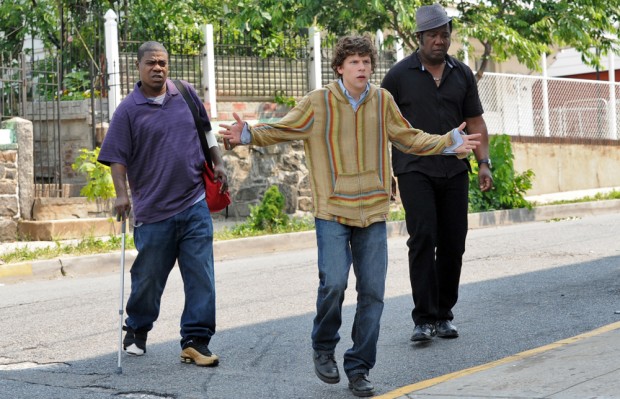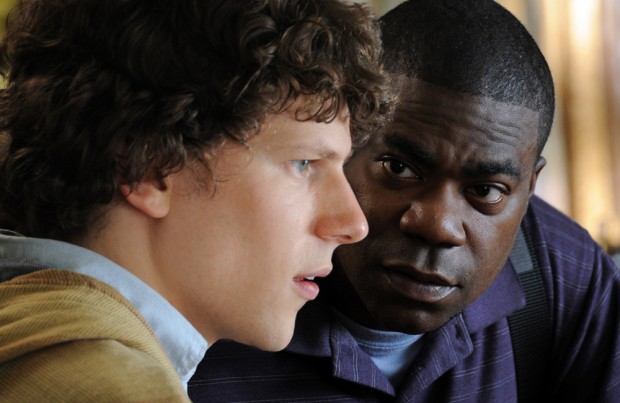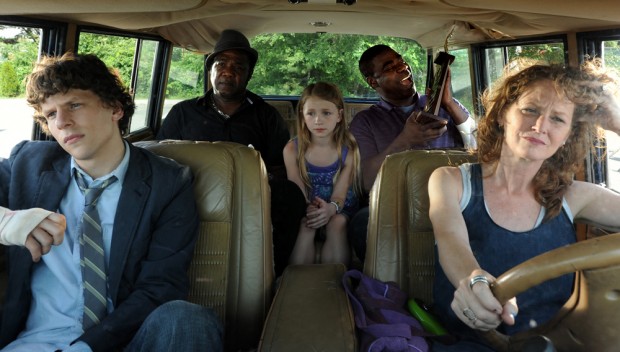Premiering just as the festival was winding down, Phil Dorling and Ron Nyswaner‘s Predisposed offered a semi-light final note to a week and a half of everything from drama to comedy to something else completely (re. The Comedy, Excision, Compliance).
Starring Jesse Eisenberg, Melissa Leo and Tracy Morgan, Predisposed tells the story of Eli (Eisenberg), a young man determined to become a concert pianist and leave the house he shares with his drug addict mother (Leo). Unfortunately, on the day Eli takes his mom to rehab, the doctors find no trace of drugs in her system and do not admit her. So begins Eli’s quest to get his mother high, with the help of a local drug dealer (Morgan).
TFS spoke with writer/directors Dorling and Nyswaner, as well as actress Melissa Leo about the evolution of the project, the thin line between tragedy and comedy and finding a family on set.
The Film Stage: How did this project come about? I know it started as a short but just…
Ron Nyswaner: It didn’t, actually. It started as a feature idea. Because I just happened to be in rehab, doing volunteer work, and somebody said ‘You know, sometimes people come here and can’t get in because they’re not high and we give them advice.’
Phil Dorling: Because they don’t have insurance.
Nyswaner: They don’t have insurance and the insurance won’t pay for it because you have to be in danger, so go out, get screwed up and then come back. And when Philip [Dorling], who had been making movies at school, wanted to go to the next step and work on a feature, and we’d known each other for a long time. So I said ‘Look, can we take this kernel of an idea and do something with it?’ And he went away and wrote an amazing first draft and we started pasting the drafts back together. I do a lot of the talking, and Philip does a lot of the writing.
[Everyone laughs]
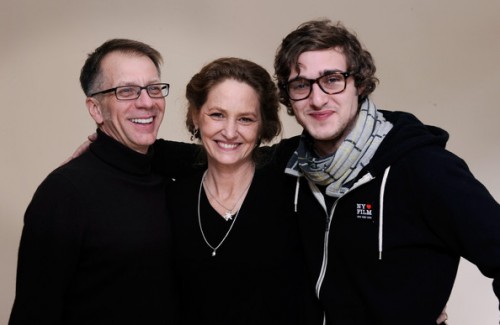 So in terms of emphasis and you guys being co-writers, it’s like [Phil] spits it on the page first-
So in terms of emphasis and you guys being co-writers, it’s like [Phil] spits it on the page first-
Nyswaner: Yeah, he’s like, ‘Wahh’ on the page. And I have a little bit more experience and I have a good eye for just that raw talent and energy. He’s catching up with me on the craft phase some I’m going to have to ditch him soon. We had this notion that these people weren’t getting into rehab and we were talking about it for a week or two and I had worked on a film as a PA that Melissa was the star of. They had known each other for quite some time, and so I said, ‘Can you call Melissa and ask her?’ And we did…
Dorling: We wrote it for her.
Nyswaner: Yeah, we did, and we were met with a very humbling ‘I’d love to be a part of this.’ Penny’s been the one thing that’s really maintained throughout this whole process is that character and the idea of this story, this theme. Those are really the two things that have really maintained for quite a few years.
Dorling: Then when it came to making the movie. Getting the movie financed and finding other actors to be in it, the first yes that you get is really helpful so you can go to people and say, ‘Melissa Leo actually likes this enough to want to be part of it.’ And that helps the next person agree to be part of this.
So really it’s like this trio – right here – that has been here since day one.
Leo: I didn’t. I mean, they said ‘Could we write something?’ and I said ‘Sure.’ [Laughs] That was my involvement. Boy, I’m glad I said ‘Sure.’ [Laughs]
Nyswaner: Yeah, there’s a loyalty and then [Jesse Eisenberg’s] been involved for a couple of years while we were still searching for financing as well. And that’s really impressive and moving. Especially after that little thing called The Social Network and that other little thing called The Fighter.
[Laughs]
Nyswaner: So we’re very honored by their loyalty.
This is a movie that’s very dramatic and very intense in a lot of ways but there’s also a lot of laughs. How did it change from the script to the set to the editing room? How hard is it to keep that balance?
Leo: The short was a much more serious, dramatic film. It’s whole tone, the whole look of it.
Dorling: Everything about it…
Leo: Yeah, everything about it was much a much darker kind of film. And I’m not quite sure how they came to the decision or realization or whatever it was that then [took] that story which would be hard in the end for an audience to swallow because I’ve been in so many down and dirty films. You know, you kill the babies and people say, ‘Oh, God, that was awful.’ So how do you get people to want to watch your movie and therefore get your story? That’s the process we were involved in and the fact of lightening it and having it be comedic and shoot it so brightly and beautifully as we ended up doing turns it on its head. This serious, drug addiction and children involved subject, and makes it more watchable and I think even at times quite enjoyable to watch the shenanigans of all of them. In some kind of way, makes the characters even more real. So however it came to that decision, it was a brilliant decision to make.
Dorling: What just occurred to me, and I know this is something that we spoke about with our cinematographer and our costume designers and all the creative people involved in making this world and what the film was going to look like…I think one of the big differences was a word that I was using over and over again. It isn’t that we were going to necessarily make it more comedic, we’re going to make it more hopeful. Which turns some of these things that are going down a very negative, harder path. Let’s make it so there is that hard journey but there is some light at the end of the tunnel. And that lightens the tone as a general thing and I think the comedy is a lot of irony. And we keep saying that it turns this somewhat dramatic theme on its head but really I think it’s the element of hope, too.
It definitely comes through. Now, about the setting. I’m actually from Upstate New York. For all of you, since you know the area so well, what is the benefit of shooting…
Leo: Why shoot anywhere but the Hudson Valley?
Right. So, tell people why.
Leo: That’s just it. Why would you go anywhere? You have absolutely anything from any time period. From now, back to the history of mankind. And before that too. The extraordinary rock fields of primitive land in the Hudson Valley. It’s an extraordinary place to shoot. That’s what I have to say about shooting there. Why go anywhere else?
Nyswaner: And it lets us go home on weekends.
Leo: That’s totally besides the point. That’s so totally beside the point because if you bring people in to shoot for two months who are not from the Hudson Valley, then they get the pleasure to know that extraordinary place. Which is maybe not such a good idea.
Nyswaner: I think all of those things, then. This story was always born in..we were all living there at the time when this was at first an idea. I think most of us were out and about working. And I was still living at home in Woodstock, New York, and this is where this story takes place. And staying true to that because we could find a million other locations and have to piece it all together or stay.
Dorling: And there are incentives. I mean New York state makes it attractive. And the Hudson Valley Film Commission makes it attractive. There are a lot of incentives.
Ron, this is kind of specific to you. You’ve been writing and directing for years and your last writing credit was on The Painted Veil.
Nyswaner: That is correct.
So, that change from a sweeping epic, classic piece of literature with a shoot in India…
Nyswaner: There’s not a drug dealer named Sprinkles in the film…
Leo: I thought that’s what you extracted the character from.
Nyswaner: [Laughs] Yea, actually, it’s a sequel, Predisposed.
Leo: [Laughs]
Nyswaner: Spinoff!
But, as a writer, what is that transition like? Is it as simple as moving on to the next project? Do you take anything from such a big project?
Nyswaner: I just get caught up in stories. A story can move me if it’s set in China or set in the Hudson Valley of New York. If it’s set in 1927 or set in 2011. You’re pulled along by the story. And I have to have a reason to get out of bed in the morning and face that computer screen.
I suppose I’m compelled that morning to get up and solve whatever that story’s problem is. It’s the same set of skills, really. What is the truth in this story and how to tell it? And what is the form this story should take? Sweeping epic? Philadelphia melodrama? Courtroom drama? Or this? So you have to find that right genre to tell the story.
In that same vein, most of you, Melissa, and Jesse and Tracy are just coming off of things like The Fighter, or The Social Network with these specific, recognizable characters that people know. Tracy with 30 Rock. Is there a worry that people are going to go into it expecting one character and getting another?
Nyswaner: Well, if you’ve seen the movie you know that he’s not.
Right. But is there an awareness of it when you’re going in to make a film?
Leo: The reality of that for this actor—I certainly could not speak for Tracy and what he does or Jesse either—but for myself, the fact of the matter is quite simple. I had actually shot The Fighter not just a year, but closer to two years prior to playing Penny. I’d played Toni Bernette on Treme for several episodes in between and I would venture to guess 10 different women as well. So my experience of it is not actually Alice Ward into Penny.
My experience, for this particular film, was the wondrous and amazing winter that The Fighter gave to me last year, and back to Treme and Toni Bernette and on to Penny where it was really nice to have a character who was as loose and freethinking as Penny was after an arduous and wonderful winter of elegance. [Laughs]. So it’s a little bit different when you’re walking in the thing. As the things come out, you say Painted Veil was his last credit, but I know for a fact that Ron writes every day.
Nyswaner: There are things that, well screenplays… the ones that get produced are a fraction of what one writes.
Phil, first feature. Very young. It’s great that you are here with this amazing group of people. Can you talk about the experience? As someone around your age myself, it’s very exciting to watch.
Dorling: Yea, it is very exciting. It’s been a very interesting journey for myself. What I think a lot of us who end up being able to succeed—and just by getting here I feel like we’ve succeeded—is somebody has to believe in you and show you some sort of reciprocation of respect. And to be frank, these two people are the first two people in a professional and creative sense gave me that confidence to really pursue this kind of career and to even make this film together, and the short, is just a humbling experience. The first short I directed has Melissa Leo in it and my co-writer is an Oscar nominee. It’s very humbling and at some point the status of all these accomplished people goes away and the work is what matters. We all care about the story. We all believe in it. That’s really the most amazing thing. To be able to work with really amazingly talented who you like. There’s a camaraderie.
Nyswaner: A lot of it, I have to say, is when it’s 5:30 AM on the sixth day of a six day week and you’ve just been told, ‘Oh, we have to pull a day out’ and your schedule is being changed and you have problems to solve. Really, everyday is about solving some artistic or physical problem. I think that filmmaking… that list of who has won this award and done all this isn’t really in play…
Leo: I think the other thing that has to be said about it too. I don’t think Ron and I would be sitting here. I’m pretty sure there wouldn’t be Predisposed at Sundance if in our saying, ‘Alright, Phil, do you wanna show us what you got?’ if he hadn’t shown us something. So, his part in it.
Nyswaner: He stepped up.
Leo: There’s not a lot of value in something that’s just given to somebody. I think that Ron and I both realize that. So, where on the outside it can look as if we gave him this opportunity, Ron and I also realize that he also gave us the opportunity because he rose to the occasion.
Nyswaner: How many people can Melissa mentor? I mean, really. You can’t walk down the street without people saying, ‘Hey, will you read my script?’ At a certain point you have to focus on somebody that can actually help me. It’s a very selfish reason, actually.
Leo: I’m still taking offers.
Alright. Well, final question for all of you. What’s next?
Leo: I will beg your viewers to watch HBO. See if they can’t find Treme on there. I will beg you to watch that however suits your fancy. If you want to go to the local sports bar and ask them to put on demand and turn on Treme that would be super duper.
Nyswaner: Aren’t you writing a new script?
Dorling: I’m working on a new project right now. That’s all I’ll say.
Nyswaner: I’m creating a mini-series for HBO that’s being produced by Elton John and his husband David Furnish and we’re going to go to Africa next month to do some research.

